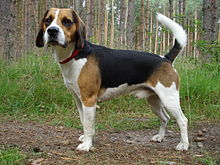Beagle-Harrier
| Beagle-Harrier | |||||||||||||||||
|---|---|---|---|---|---|---|---|---|---|---|---|---|---|---|---|---|---|
 Beagle-Harrier | |||||||||||||||||
| Origin | France | ||||||||||||||||
| |||||||||||||||||
| |||||||||||||||||
| Dog (domestic dog) | |||||||||||||||||
The Beagle-Harrier is a scenthound. It is a breed of dog originating from France.
Characteristics
Appearance

The Beagle-Harrier appears to be either a large Beagle or a small Harrier. It is a medium-sized dog, between 45 and 50 centimeters (18 and 20 inches) tall at the withers,[1] and it weighs between 19 and 21 kilograms (42 and 46 pounds).[2] Its coat is usually tricolor, featuring the colors fawn, black, tan, or white. There are also grey-coated (tricolor) Beagle-Harriers.[1] The Beagle-Harrier's body is usually muscular and its coat smooth and thick.[1]
Temperament
The Beagle-Harrier is generally good with children and other pets. They are loyal and determined, making them a good family pet. They are a hunting breed and so require a lot of exercise and space.
Health
The Beagle Harrier is generally healthy and has a life span of 12 to 13 years. Hip dysplasia could cause a big problem.[3]
History
Beagle-Harriers were bred in France in the 19th century by Baron Gerard.[citation needed] The Beagle Harrier could be a mixture of two breeds, the Beagle and the Harrier, or the midpoint in breeding between the two breeds.[4] The Beagle-Harrier was later imported into America in the mid-1800s to hunt rabbits.[5] It was recognized by the FCI in 1974.[6] The Beagle-Harrier can now be quite rarely found in France and is even more rare in other countries.[7]
See also
References
- ^ a b c FCI standards Archived February 7, 2007, at the Wayback Machine Retrieved 7 March 2007.
- ^ Continental Kennel Club Archived October 30, 2006, at the Wayback Machine Weight. Retrieved 7 March 2007.
- ^ Beagle Harrier Health Problems section. Retrieved 5 March 2007.
- ^ Breed History Background information section. Retrieved 7 March 2007.
- ^ "Beagle-Harrier". 2puppies.com. Archived from the original on April 12, 2016. Retrieved 1 October 2016.
- ^ Beagle Harrier (FCI) Archived 2007-04-13 at the Wayback Machine History section. Retrieved 5 March 2007.
- ^ Beagle Harrier rarity Background information section. Retrieved 5 March 2007.
